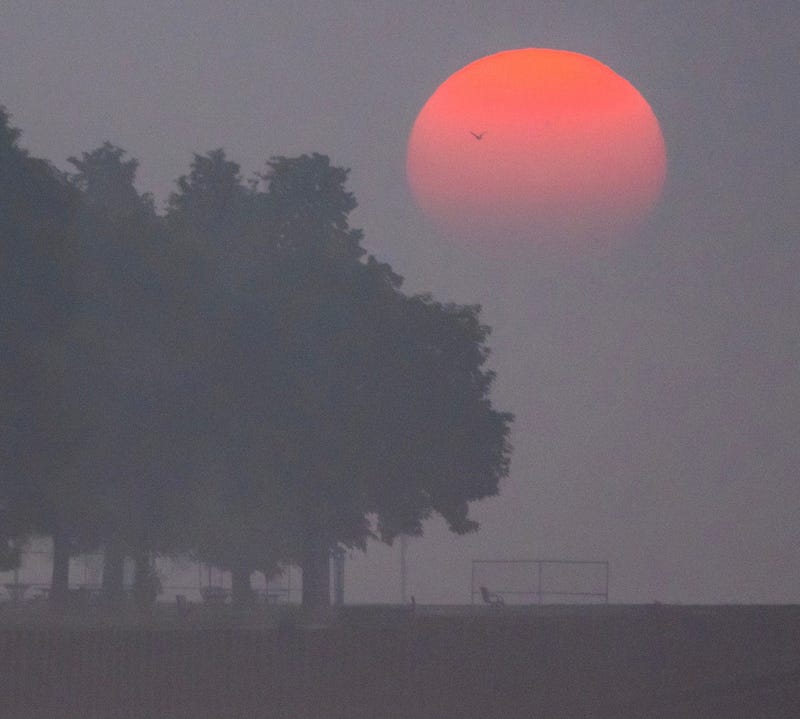
DETROIT (WWJ) - Michigan has seen some relief from haze and bad air caused by Canadian wildfires so far this month after thick plumes of smoke converged on the Midwest at the end of June -- but the fires are still raging and new alerts are in effect.
The Michigan Department of Environment, Great Lakes and Energy has issued an Air Quality Alert for the entire state on Sunday, July 16, due to elevated levels of fine particulate (PM2.5). The alert has been extended through Monday.
Air Quality Index (AQI) levels expected to be in the Unhealthy for Sensitive Groups, which ranges from 101 to 150 AQI.
According to the Environmental Protection Agency, this range encompasses at-risk individuals with conditions such as heart and lung disease, older adults, children, people with diabetes, and people of lower SES. Those effected could experience health effects when engaged in outdoor activities and are encouraged to stay indoors
The National Weather Service said the alert is being triggered by smoke originating from west and central Canada. Experts forecast that the haze will blow into Michigan from the northwest Saturday into Sunday.
"As this happens, increases in PM2.5 concentrations are expected across the Upper Peninsula Saturday, then Sunday across the rest of the state as the plume sinks south," officials warned. "The Air Quality Index will likely increase into the Unhealthy for Sensitive Groups (Orange) range; however, hourly concentrations reaching the Unhealthy (Red) level are possible."
The poor air quality has led to a number of cancelations and delays at Metro Detroit Airport. FlightAware.com reports 139 flights have been delayed and 26 were canceled on Sunday.
Wildfire smoke consists of a mixture of gases and fine particles produced when wood and other organic materials burn, the EPA stated, but the biggest health threat from smoke is from fine particles.
"These microscopic particles can get into your eyes and respiratory system, where they can cause health problems such as burning eyes, runny nose, and illnesses such as bronchitis," the EPA added. "Fine particles also can aggravate chronic heart and lung diseases - and even are linked to premature deaths in people with these conditions."
According to environmental experts, wildfire smoke is particularly potent because it has the ability to travel great distances.
EGLE officials advised that residents reduce or eliminate activities that contribute to air pollution, such as outdoor burning, and use of residential wood burning devices.
Michiganders are also encouraged to keep windows closed overnight to prevent smoke from getting indoors and, if possible, run central air conditioning with MERV-13 or higher rated filters.
The EPA also recommends the following precautions:
• Use common sense. If it looks smoky outside, it's probably not a good time to mow the lawn or go for a run. And it's probably not a good time for your children to play outdoors.
• Pay attention to local air quality reports. Stay alert to smoke-related news coverage or health warnings.
• Visit AirNow to find out the Air Quality Index in your area. As smoke gets worse, the amount of particles in the air changes - and so do the steps you should take to protect yourself. AirNow recommends precautions you can take to protect your health when air pollution gets bad.
• If you are advised to stay indoors, take steps to keep indoor air as clean as possible. When smoke levels are high, try to avoid using anything that burns, such as wood fireplaces, gas logs, gas stoves - and even candles! Don't vacuum. That stirs up particles already inside your home. And don't smoke. That puts even more pollution in your lungs, and in the lungs of people around you.
If you have asthma or other lung disease, make sure you follow your doctor's directions about taking your medicines and following your asthma management plan. Call your doctor if your symptoms worsen.
• Run your air conditioner if you have one. Keep the fresh air intake closed and the filter clean to prevent bringing additional smoke inside. Note: If you don't have an air conditioner, staying inside with the windows closed may be dangerous in extremely hot weather. In these cases, seek alternative shelter.
• If you have heart or lung disease, if you are an older adult, or if you have children, talk with your doctor about whether and when you should leave the area. When smoke is heavy for a prolonged period of time, fine particles can build up indoors, even though you may not be able to see them.
The wildfire smoke is not only slated to effect Michigan -- all of Wisconsin, Illinois and Indiana as well as parts of Minnesota, Montana, Nebraska and Colorado are all under alerts due to the incoming haze.
For further information, please see the Michigan Department of Environment, Great Lakes, and Energy`s Air Quality page on the internet at: http://www.deqmiair.org/

